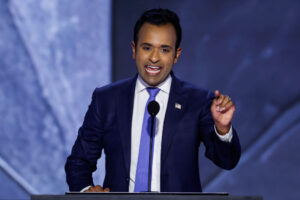WASHINGTON D.C.: The U.S. economy is on the “brink” of a recession, and avoiding a downturn will require an element of “luck,” according to a stark new warning from Mark Zandi, the chief economist at Moody’s Analytics. In a report that has sent ripples through financial markets, Zandi’s analysis puts the probability of a recession within the next year at nearly 50%, highlighting a fragile economic landscape.
The primary culprit, according to the report, is the aggressive and rapid pace of interest rate hikes by the U.S. Federal Reserve. While these hikes are the central bank’s key tool to combat persistent, multi-decade high inflation, Zandi cautions that they are dangerously close to “overtightening” the economy, pushing it into a significant slowdown.
The Federal Reserve’s Tightrope Walk
The Fed is engaged in a high-stakes balancing act. Its dual mandate is to maintain price stability (taming inflation) and achieve maximum employment. However, its rapid rate increases, designed to cool demand and lower prices, are now showing signs of putting the brakes on economic growth too hard. The latest data reveals a weakening job market, with job growth slowing dramatically and some sectors already shedding workers.
The biggest challenge facing the Fed is the stubborn nature of inflation, particularly in the services sector, including areas like healthcare, housing, and transportation. Unlike goods inflation, which has shown some signs of cooling, services inflation is proving to be far more persistent and less responsive to interest rate changes.
The Role of “Luck” and a Soft Landing
Zandi’s use of the term “luck” underscores the narrow path ahead. A key factor that could help the economy avoid a recession is a boost in productivity growth. If businesses can find ways to produce more goods and services with the same amount of resources, it could help lower costs and bring down inflation without the need for the Fed to further crush demand.
The warning from Moody’s stands in contrast to the more optimistic view held by some economists and the Fed itself, who believe a “soft landing” is still possible. A soft landing would see inflation gradually return to the Fed’s 2% target without causing a major recession or a significant rise in unemployment. This is a rare feat in economic history, which is why Zandi’s warning is so potent.
A recession would bring painful consequences, including rising unemployment, reduced consumer spending, and potential market volatility, making the current economic debate a central concern for policymakers and households alike.















